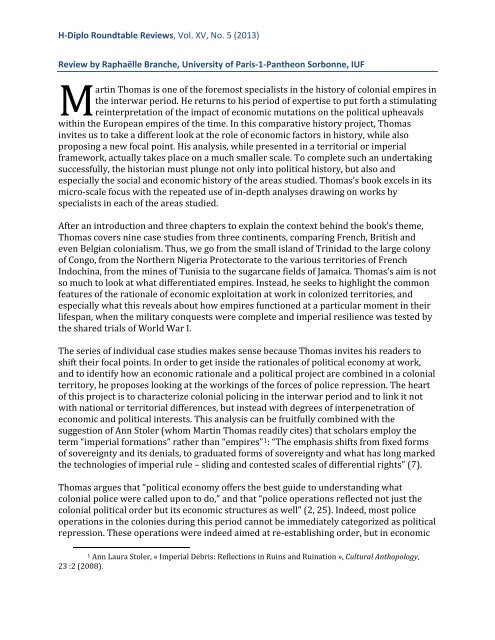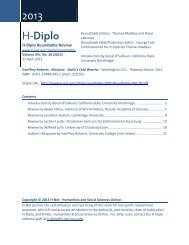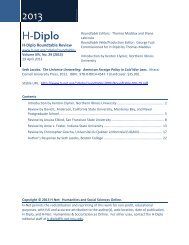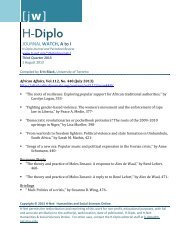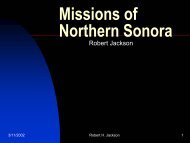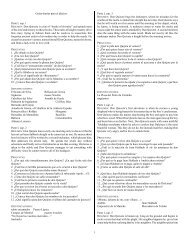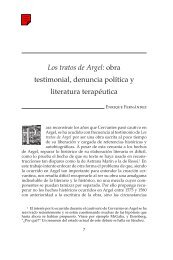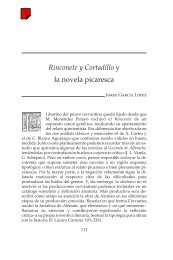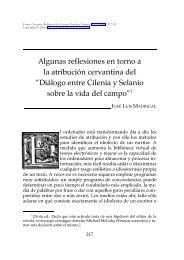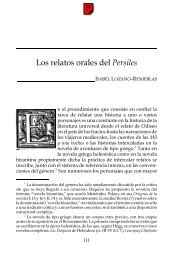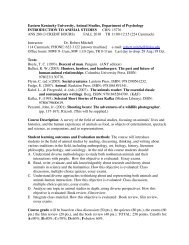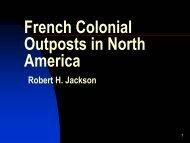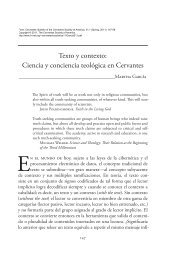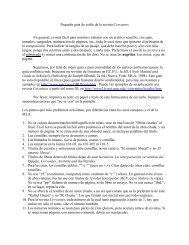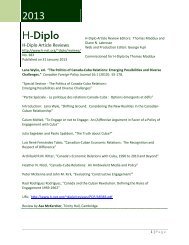H-Diplo Roundtable on Martin Thomas. Violence and ... - H-Net
H-Diplo Roundtable on Martin Thomas. Violence and ... - H-Net
H-Diplo Roundtable on Martin Thomas. Violence and ... - H-Net
Create successful ePaper yourself
Turn your PDF publications into a flip-book with our unique Google optimized e-Paper software.
H-<str<strong>on</strong>g>Diplo</str<strong>on</strong>g> <str<strong>on</strong>g>Roundtable</str<strong>on</strong>g> Reviews, Vol. XV, No. 5 (2013)<br />
Review by Raphaëlle Branche, University of Paris-1-Panthe<strong>on</strong> Sorb<strong>on</strong>ne, IUF<br />
M<br />
artin <strong>Thomas</strong> is <strong>on</strong>e of the foremost specialists in the history of col<strong>on</strong>ial empires in<br />
the interwar period. He returns to his period of expertise to put forth a stimulating<br />
reinterpretati<strong>on</strong> of the impact of ec<strong>on</strong>omic mutati<strong>on</strong>s <strong>on</strong> the political upheavals<br />
within the European empires of the time. In this comparative history project, <strong>Thomas</strong><br />
invites us to take a different look at the role of ec<strong>on</strong>omic factors in history, while also<br />
proposing a new focal point. His analysis, while presented in a territorial or imperial<br />
framework, actually takes place <strong>on</strong> a much smaller scale. To complete such an undertaking<br />
successfully, the historian must plunge not <strong>on</strong>ly into political history, but also <strong>and</strong><br />
especially the social <strong>and</strong> ec<strong>on</strong>omic history of the areas studied. <strong>Thomas</strong>’s book excels in its<br />
micro-scale focus with the repeated use of in-depth analyses drawing <strong>on</strong> works by<br />
specialists in each of the areas studied.<br />
After an introducti<strong>on</strong> <strong>and</strong> three chapters to explain the c<strong>on</strong>text behind the book’s theme,<br />
<strong>Thomas</strong> covers nine case studies from three c<strong>on</strong>tinents, comparing French, British <strong>and</strong><br />
even Belgian col<strong>on</strong>ialism. Thus, we go from the small isl<strong>and</strong> of Trinidad to the large col<strong>on</strong>y<br />
of C<strong>on</strong>go, from the Northern Nigeria Protectorate to the various territories of French<br />
Indochina, from the mines of Tunisia to the sugarcane fields of Jamaica. <strong>Thomas</strong>’s aim is not<br />
so much to look at what differentiated empires. Instead, he seeks to highlight the comm<strong>on</strong><br />
features of the rati<strong>on</strong>ale of ec<strong>on</strong>omic exploitati<strong>on</strong> at work in col<strong>on</strong>ized territories, <strong>and</strong><br />
especially what this reveals about how empires functi<strong>on</strong>ed at a particular moment in their<br />
lifespan, when the military c<strong>on</strong>quests were complete <strong>and</strong> imperial resilience was tested by<br />
the shared trials of World War I.<br />
The series of individual case studies makes sense because <strong>Thomas</strong> invites his readers to<br />
shift their focal points. In order to get inside the rati<strong>on</strong>ales of political ec<strong>on</strong>omy at work,<br />
<strong>and</strong> to identify how an ec<strong>on</strong>omic rati<strong>on</strong>ale <strong>and</strong> a political project are combined in a col<strong>on</strong>ial<br />
territory, he proposes looking at the workings of the forces of police repressi<strong>on</strong>. The heart<br />
of this project is to characterize col<strong>on</strong>ial policing in the interwar period <strong>and</strong> to link it not<br />
with nati<strong>on</strong>al or territorial differences, but instead with degrees of interpenetrati<strong>on</strong> of<br />
ec<strong>on</strong>omic <strong>and</strong> political interests. This analysis can be fruitfully combined with the<br />
suggesti<strong>on</strong> of Ann Stoler (whom <strong>Martin</strong> <strong>Thomas</strong> readily cites) that scholars employ the<br />
term “imperial formati<strong>on</strong>s” rather than “empires” 1 : “The emphasis shifts from fixed forms<br />
of sovereignty <strong>and</strong> its denials, to graduated forms of sovereignty <strong>and</strong> what has l<strong>on</strong>g marked<br />
the technologies of imperial rule – sliding <strong>and</strong> c<strong>on</strong>tested scales of differential rights” (7).<br />
<strong>Thomas</strong> argues that “political ec<strong>on</strong>omy offers the best guide to underst<strong>and</strong>ing what<br />
col<strong>on</strong>ial police were called up<strong>on</strong> to do,” <strong>and</strong> that “police operati<strong>on</strong>s reflected not just the<br />
col<strong>on</strong>ial political order but its ec<strong>on</strong>omic structures as well” (2, 25). Indeed, most police<br />
operati<strong>on</strong>s in the col<strong>on</strong>ies during this period cannot be immediately categorized as political<br />
repressi<strong>on</strong>. These operati<strong>on</strong>s were indeed aimed at re-establishing order, but in ec<strong>on</strong>omic<br />
1 Ann Laura Stoler, « Imperial Debris: Reflecti<strong>on</strong>s in Ruins <strong>and</strong> Ruinati<strong>on</strong> », Cultural Anthopology,<br />
23 :2 (2008).


